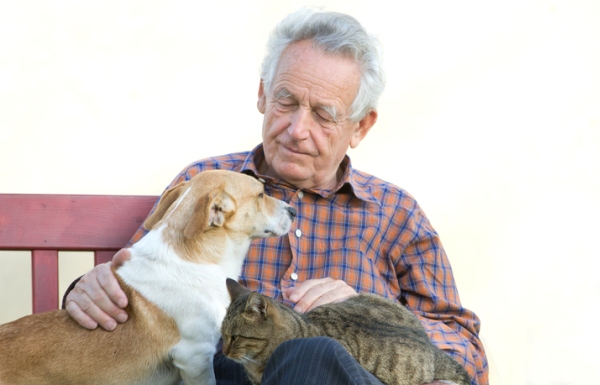Why is My Pet Suddenly So Clingy?

As pet owners, we learn what our dog or cat wants primarily by paying attention to how they act. However, it's not always easy to understand what's going on when a change in behavior happens. Sometimes a normally independent pet can suddenly become clingy for no apparent reason, and it's our job to figure out why. Here are some possible reasons.
Undiagnosed Medical Issue
Anytime there's a change in how your dog or cat interacts with you, that's a red flag. Pay attention if your pet suddenly becomes clingy because it might be an indication of a medical issue. Not feeling well is confusing to your pet, and some feel more secure being close to someone they trust. Some pets may become clingy just before they have a seizure. Epilepsy is more common in dogs than cats, but felines can have seizures, too. A seizure can be caused by bacterial, viral, fungal or parasite infections, feline infectious peritonitis (FIP), exposure to toxins or other medical issues.
The Aging Process
Your dog or cat may experience a deterioration in hearing or vision as they age, but even younger pets can sometimes have issues. Not being able to hear or see as well as they used to can cause a pet to be clingy and stay close to his owner so he's more aware of what's going on. Clingy behavior can also be a sign that a senior pet is in the early stages of cognitive dysfunction. If you notice your pet bumping into furniture or seems to be confused, a vet checkup is recommended.
Changes in Routine
Pets want and need a routine. They like to know what to expect. Changes can be upsetting to our furry friends. Some of the things that can cause an independent dog or cat to feel insecure and become clingy are: a new baby, a child leaving for college or moving out of the home, the death of a human or animal family member, bringing another pet into the home, a change in their feeding or walking schedule, a change in your work schedule or moving to a new home.
Fear, Stress, Anxiety
Security and feeling safe in the home is as important to dogs and cats as it is to us. A normally outgoing pet can show signs of stress and may become clingy if he feels uncertain for some reason. It could be he's being bullied by another pet in the home or mistreated by a family member, friend or neighborhood children. If your pet acts differently when certain people or pets are around, this could indicate that the person or pet makes him feel uncomfortable or fearful of them.
If your pet runs to you during a thunderstorm or when fireworks are going off in the neighborhood, that's an in-your-face clue that he's afraid. Christmas, Thanksgiving and other holidays with lots of family and friends in the home can also be stressful and cause anxiety in some pets.
Adopted From a Shelter
Like us, pets have life experiences that shape their outlook on life. Many pets adopted from the shelter have an unknown history. A pet may have been adopted multiple times and returned to a shelter before finding his forever home with you. You can't know what he's been through in another home or as a stray. A pet who seems outgoing at the shelter may become clingy once in a new home. A sudden desire to be close to you could be his way of reassuring himself that this new home isn't just temporary.
It can take some time for an adopted pet to feel safe and secure. You can help them adjust with a set routine along with playtime and training. Earning your pet's trust and establishing a bond will reduce his stress and anxiety. Be patient, calm and positive, and reward good behavior with lots of praise and CANIDAE treats.
Your Pet is About to Give Birth
Some dogs and cats become very clingy just before they give birth or during the birth. Take it as a compliment and a sign of how comfortable your pet is with you. Giving birth is stressful and exhausting for the mother; she wants to be close to the person she loves and trusts during this time.
A normally independent dog or cat that suddenly becomes clingy is a warning that should not be ignored. Conversely, a pet that is usually clingy and suddenly becomes withdrawn is also a sign that something is amiss. Never hesitate to seek medical advice from your veterinarian for any sudden change in your pet's behavior.
